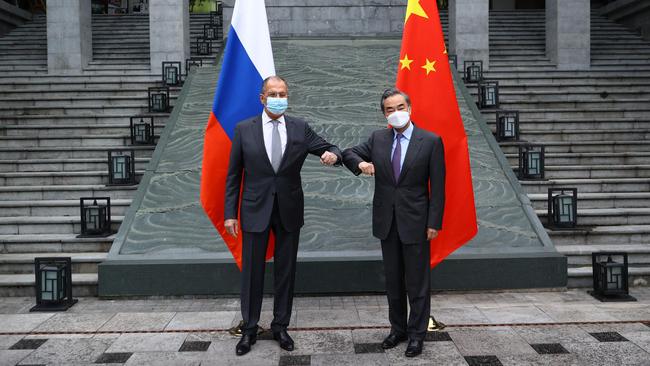Russia seeks alliance with China to beat US sanctions
Russia and China have presented a united front against the US as they discussed ways of resisting Western sanctions.

Russia and China have presented a united front against the US as they discussed ways of resisting Western sanctions after clashes with the Biden administration.
Sergei Lavrov, the Russian Foreign Minister, on a visit to meet his counterpart Wang Yi in China, spoke of efforts to build “technological independence” and bypass Western financial systems.
Moves towards greater co-operation between the countries come at a time of renewed superpower jousting after uncompromising talks between senior Chinese and US officials, and barbs between Joe Biden and Vladimir Putin.
The Biden administration is building an alliance to oppose Chinese ambitions in the Indo-Pacific region, and also seeking to bolster Western resistance to Russian and Chinese misconduct.
Mr Biden said that Moscow would “pay a price”, with new sanctions expected as soon as this week for interfering in last year’s US elections. On Monday (Tuesday AEDT) the EU imposed measures on four Chinese officials accused of repressing Uighur Muslims, provoking swift retaliation.
In a separate flashpoint, the French foreign ministry said it had summoned China’s ambassador in a row over a proposed visit by French senators to Taiwan. It accused Lu Shaye of “insults and threats toward lawmakers and a French researcher” and said that it would remind him of the “elementary rules as set out by the Vienna Convention on diplomatic relations”.
Antoine Bondaz, a researcher at the Foundation for Strategic Research in Paris, had been denounced by the Chinese embassy as a “small-time criminal” and an “ideological troll” after he accused it of putting pressure on the senators to cancel the visit. The embassy denounced its critics in the media and academia as “mad hyenas” and promised to fight them “tooth and nail”.
Mr Lavrov, who has previously called for moves to undermine the dollar, said that Russia and China were working together in the interests of humanity. “These objective developments, which are leading to the formation of a truly multipolar and democratic world, are unfortunately being hindered by Western countries, particularly the US,” he said as he arrived in China.
“We need to reduce sanctions risks by bolstering our technological independence, by switching to payments in our national currencies and global currencies that serve as an alternative to the dollar. We need to move away from using international payment systems controlled by the West.”
His comments may be seen in Washington as an indication that sanctions worry Moscow and are worth pursuing.
Mr Lavrov’s invitation to the southern city of Guilin was made before Sino-US talks last week in Alaska, which were overshadowed by a slanging match. Antony Blinken, the Secretary of State, said China risked a rise in violence by flouting the global rules-based order. Yang Jiechi, China’s top diplomat, accused the US of condescension.
Tensions with Russia are high after Mr Biden agreed in an interview that Mr Putin was a “killer”. The Russian leader said: “It takes one to know one.”
Mr Lavrov’s ministry this week criticised Mr Biden for rejecting Mr Putin’s offer of a quick public call together to defuse tensions. “One more opportunity has been missed to find a way out of the deadlock in Russian-US relations created through the fault of Washington,” it said. “Responsibility for this lies entirely with the US.”
Chinese state media said the idea of closer co-operation with Russia to thwart the West was likely to go down well in Beijing. US sanctions on Russia for election meddling could range from freezing the American assets of individual citizens to curbing the government’s ability to issue sovereign debt.
Mr Lavrov added to the tensions around his two-day visit by wearing a facemask emblazoned with “FCKNG QRNTN”, prompting Dmitry Kiselyov, a Russian state TV presenter, to say: “The minister of a country that is controlling COVID better than the West is saluting everyone who lectured Russia.”
The Global Times, a Chinese state newspaper, described Mr Lavrov’s visit as “a countermove of US diplomatic layout against China and Russia”. It quoted Chinese academics who said Beijing and other countries would welcome moves to set up an alternative to the Swift system of international financial transactions. Swift is based in Belgium but has faced controversy over claims that the US has used it to enforce sanctions against countries like Iran.
The Times



To join the conversation, please log in. Don't have an account? Register
Join the conversation, you are commenting as Logout